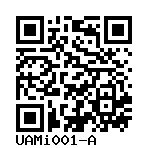PCCA23-FiPS4F8
UAMi001-A
General
Cell Line |
|
| hPSCreg name | UAMi001-A |
| Cite as: | UAMi001-A (RRID:CVCL_QX83) |
| Alternative name(s) |
PCCA23-FiPS4F8
|
| Cell line type | Human induced pluripotent stem cell (hiPSC) |
| Similar lines |
|
| Last update | 2nd August 2022 |
| User feedback | |
Provider |
|
| Generator |
Universidad Autonoma de Madrid (UAM)
Contact:
Universidad Autonoma de Madrid (UAM) |
| Owner | Universidad Autonoma de Madrid (UAM) |
| Derivation country | Spain |
External Databases |
|
| Cellosaurus | CVCL_QX83 |
| Wikidata | Q54973881 |
| BioSamples | SAMEA110403759 |
General Information |
|
| Publications |
|
| * Is the cell line readily obtainable for third parties? |
No |
Donor Information
General Donor Information |
|
| Sex | female |
Phenotype and Disease related information (Donor) |
|
| Diseases | A disease was diagnosed.
|
| Disease associated phenotypes |
|
External Databases (Donor) |
|
| BioSamples | SAMEA110403917 |
Ethics
| Has informed consent been obtained from the donor of the embryo/tissue from which the pluripotent stem cells have been derived? | Yes |
| Was the consent voluntarily given? | Yes |
| Has the donor been informed that participation will not directly influence their personal treatment? | Yes |
| Can you provide us with a copy of the Donor Information Sheet provided to the donor? | No |
| Provide contact information of the holder of the original Donor Information Sheet: | Eva Richard |
| Do you (Depositor/Provider) hold the original Donor Consent Form? | Yes |
| Alternatives to consent are available? | No |
| Is there other documentation provided to the donor for consenting purposes? | No |
| Confirm that consent was obtained by a qualified professional | Yes |
| Please indicate whether the data associated with the donated material has been pseudonymised or anonymised. | anonymised |
| Does consent explicitly allow the derivation of pluripotent stem cells? | Yes |
| Does consent prevent CELLS DERIVED FROM THE DONATED BIOSAMPLE from being made available to researchers anywhere in the world? | Yes |
| How may genetic information associated with the cell line be accessed? | Open Access |
| Will the donor expect to receive financial benefit, beyond reasonable expenses, in return for donating the biosample? | No |
| Has a favourable opinion been obtained from a research ethics committee, or other ethics review panel, in relation to the Research Protocol including the consent provisions? | Yes |
| Name of accrediting authority involved? | Universidad Autónoma de Madrid |
| Approval number | CEI 112 - 2189 |
| For generation of the cell line, who was the supplier of any recombined DNA vectors or commercial kits used? |
hIPSC Derivation
General |
|
| Source cell type | |
Reprogramming method |
|
| Vector type | Non-integrating |
| Vector | Sendai virus |
Vector free reprogramming |
|
Other |
|
| Derived under xeno-free conditions |
Unknown |
| Derived under GMP? |
Unknown |
| Available as clinical grade? |
Unknown |
Culture Conditions
| Medium |
mTeSR™ Plus
|
Characterisation
Analysis of Undifferentiated Cells
| Marker | Present | Absent |
| mCpG | ||
| OCT4 | X |
Differentiation Potency
Genotyping
Karyotyping (Cell Line) |
|
| Has the cell line karyotype been analysed? |
Yes
|
Other Genotyping (Cell Line) |
|


Login to share your feedback, experiences or results with the research community.